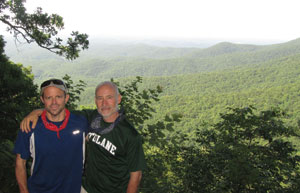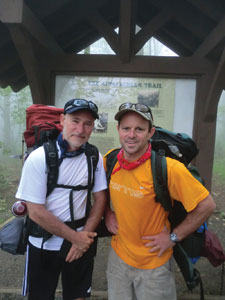 It sounds like it could be the beginning of a joke. “A rabbi and a president go into the woods…” But it was no joke when Andrew Kaplan, who became president of The Temple, Congregation B’nai Jehudah June 1, suggested that he and the congregation’s senior rabbi, Arthur Nemitoff, get to know each other better by hiking along the Appalachian Trail in the Georgia mountains. Last month they took that journey, hiking 27 miles over a four-day period.
It sounds like it could be the beginning of a joke. “A rabbi and a president go into the woods…” But it was no joke when Andrew Kaplan, who became president of The Temple, Congregation B’nai Jehudah June 1, suggested that he and the congregation’s senior rabbi, Arthur Nemitoff, get to know each other better by hiking along the Appalachian Trail in the Georgia mountains. Last month they took that journey, hiking 27 miles over a four-day period.
Rabbi Nemitoff has been a rabbi for 30 years now and while he’s bonded with many presidents over the years, usually by “praying together and socializing together,” at meetings and meals, this was the first time he’d ever entertained such a request.
He said he immediately accepted the offer, partly because it was intriguing, and certainly not really understanding what it involved.
“I felt it was a unique opportunity and something I’ve personally never done before,” Rabbi Nemitoff said. “I know Andrew is a passionate person about those things in which he believes and it was clear in listening to him that this was a passionate desire of his. So therefore I needed to trust him.”
Kaplan is a hiker and he suggested the adventure because he understands the “power of the shared experience and the campfire.”
“I have experienced no better way to develop a true relationship than to share the pain of a near impossible uphill hike with the pleasure of watching the sun set in the middle of the woods around a roaring campfire.
Both venues, altogether different, are where you really learn about a person,” Kaplan said.
So for nine months the two planned and prepared for the trip. Kaplan, who had hiked portions of the Appalachian Trail several times in the past, planned it. The goal was to start at the beginning of the trail in Georgia, at Springer Mountain, and walk north, perhaps getting as far as Blood Mountain, 40 miles to the north
As part of the preparations, Kaplan suggested Rabbi Nemitoff exercise to get in shape. The rabbi did just that, walking on a treadmill with an incline because “there aren’t too many mountains in Kansas.” Eventually he added carrying a 25-pound backpack to his regimen. But nothing really prepared him for the trip, both physically and emotionally.
Rabbi Nemitoff said they ended up hiking about 27 miles, because they went slower on the hike than Kaplan had anticipated. Along the way, the rabbi said he learned that one person’s stroll is another person’s struggle.
“Andrew has hiked this portion of the trail before and he is in much better physical condition than I am. I would say that half of the trip went very well and I struggled with the other half, basically the uphill portion. Andrew was incredibly patient and supportive as I struggled through it. But we did it,” Rabbi Nemitoff said.
 Although they encountered no bears or blisters, and their backpacks worked fine, there were challenges. Rabbi Nemitoff had not fully realized what carrying a 40-plus pound backpack during six hours of walking up and down mountains was really like. Kaplan had not fully anticipated the series of introspective questions the rabbi challenged him with throughout the journey.
Although they encountered no bears or blisters, and their backpacks worked fine, there were challenges. Rabbi Nemitoff had not fully realized what carrying a 40-plus pound backpack during six hours of walking up and down mountains was really like. Kaplan had not fully anticipated the series of introspective questions the rabbi challenged him with throughout the journey.
Along the way, they met a cast of characters, including Jewish teens from Cleveland who were led by a 21-year-old Israeli working for the local JCC camp, a dental appliance salesman, an ex-Cobra helicopter pilot and a Jr. ROTC instructor. And, while they didn’t quite make it to Blood Mountain, they accomplished their goal: to get to know one another in an environment free of all artifice — no phones, no emails, no tables — just two guys relying on one another, cooking their food over an open fireplace, sleeping out under the stars, and walking and talking for hours at a time.
“We developed a real and strong personal connection which will help in our professional connection. You can’t get there any other way then to struggle because the struggle is where we grow,” Kaplan said. “This was about developing personal relationships. The base of everything we do, whether in business or in pleasure, starts with a personal relationship and if you have trust and respect, that’s the foundation you have to build on. Without that, you’ve got nothing.”
Rabbi Nemitoff added that the journey was their destination.
“The goal was not to get 40 miles up and down the mountain. The goal was to spend time together and get to know each other. I’d venture to guess no rabbi and president have ever done this before. It was incredibly wise on Andrew’s part and incredibly insightful that he asked,” Rabbi Nemitoff said.
Others may not need to take such a journey to forge business, or in this case congregational relationships, but Rabbi Nemitoff recommends taking such a step for everyone.
“You never know what is just around the next bend,” he said. “Sometimes we have to be willing to take the next step to see what’s around the bend. It might be more glorious and more magnificent than you’ve ever imagined. You have to have the courage to take the next step.”
As he’s told this story to others around town, Rabbi Nemitoff has been urged to share it across the country because it is a model for partnership.
“Whether it’s walking the trail or not is irrelevant. It’s creating those moments where there’s nothing artificial in between those two individuals in order to develop that close, intimate relationship where you learn how to trust one another,” Rabbi Nemitoff said. “As Andrew said, when you are able to be around the campfire or on the trail you have to trust one another, shut off all of our defenses and reveal who we really are to one another.”
As a postscript to this story, when Kaplan suggested the trail and Rabbi Nemitoff agreed, he added a caveat: that Kaplan join him in some adventure of the rabbi’s choosing. Kaplan also agreed. That trip is still to be planned, but will occur sometime in 2012. Where? The rabbi has not yet decided.
Four lessons learned on the trail
Rabbi Arthur Nemitoff never did any serious hiking before his trip to the Appalachian Trail with The Temple, Congregation B’nai Jehudah President Andrew Kaplan. In a sermon to the congregation June 24, he explained four lessons he learned that overshadowed anything physical.
Lesson 1: “Carry only what you need. Everything else is excess burden.”
Rabbi Nemitoff explained his backpack was heavy and as he struggled with that weight, he began to understand a little better that we also go through life with extra baggage we don’t need.
“We carry stuff in our lives in terms of tsuris (troubles), and pain and angst and all it does is weigh us down. It doesn’t allow us to go where we need to go as fast as we need to get there. If we can figure out a way, unlike me on the trail, to shed that excess stuff in our lives, our lives would be a lot easier.”
Lesson 2: “Support doesn’t imply weakness but rather wisdom. Stability and balance come with help.” “One of the things that Andrew told me was when we got on the trail we would find ourselves walking sticks,” Rabbi Nemitoff said. He explained that after walking around with a 40-pound backpack a hiker needs extra support.
“Smart people on the trail use a walking stick and the same is true in life. In life we think sometimes that getting help from someone implies weakness on their part.” But, according to Rabbi Nemitoff, it’s just the opposite.
“When we allow people to help us it gives us the support we need to have balance and stability in our lives. We live in a world, in a country, that is self-reliant. That is counter intuitive to the Jewish tradition. The Jewish tradition says allow people to help you. Let people be your support so you can achieve balance and stability.”
Lesson 3: “Walk right and live happy.”
On more than one occasion, Rabbi Nemitoff was in awe of the world around him and the magnificence of nature he was seeing.
“This world is an incredible gift and we can mess with it as much as we want … but it’s only going to get as good as we allow it to be,” he said. “We should allow ourselves to discover how to have a smaller footprint in this world, to have less of an indent in it to allow it to be here for the next generation and the next.”
Lesson 4: “One person’s struggle is another person’s struggle.”
“I came to love Andrew Kaplan. …What was easy for him was incredibly difficult for me, but we did the same thing.”
Rabbi Nemitoff said the lesson here is the need to always be aware of experiencing what the other person is experiencing.
“We need to be sensitive to their needs as well as ours ... (Andrew) was incredibly patient and stayed with me every step of the way. And recognizing that in return, I realized that I was keeping him from working himself out and I tried to be sensitive to that as well.”


